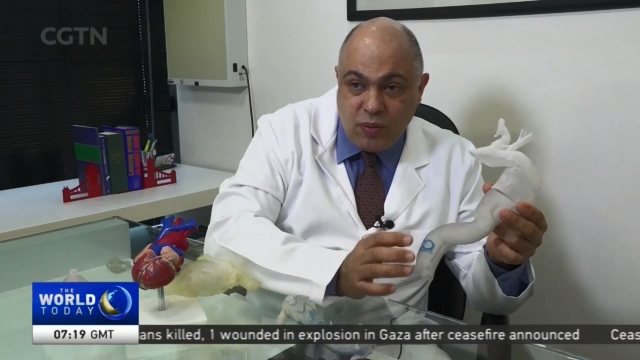
15:42, 16-Jul-2018
Medicine and 3D Printing: Brazilian company pioneers in creating artificial body parts
Updated
14:53, 19-Jul-2018
02:55

The impact of 3D printing in the world of medicine is making a difference in the lives of many. CGTN's Paulo Cabral visited a company in Sao Paulo that's betting on the expansion of this technology.
Printing body parts is not just for science fiction. It's the business of this company in Brazil: BioArchitects, founded four years ago by young entrepreneur Felipe Marques. Just out of college with a degree in economics, he saw potential in investing in medical 3D printing.
FELIPE MARQUES FOUNDER AND CEO OF BIOARCHITECTS "The 4th Industrial Revolution arises from the combination of many different technologies, and I believe 3D printing is one of them. It will change everything, from how you perform surgery, which is our case here, to any other product you purchase. For example, to buy a toy in the future you may not buy the actual toy? but a file that you'll be able to print at home."
With computer modelling based on CAT Scan imagery, BioArchitects prints exact 3D models of a patients' organ. So, doctors can actually see and manipulate a replica of what they'll find when they operate. This surgeon has been using models of his patients' hearts to decide on procedures - like choosing the exact location of an incision or the best way to access the organ - before the actual operation.
MOISE DALVA HEART SURGEON "People don't have a zipper on their chests that you can just open and close. You have to get it right the first time, in a safe and definite way. So having the possibility of observing all anatomical structures and of actually practicing the surgery beforehand enormously increases patient safety."
PAULO CABRAL SAO PAULO "These models can also be used for educational purposes. So, for example, this one is for doctors to train how to inject Botox. So just look, everything that happens here is reflected on the screen. This is my needle over the patient's forehead. Let me try to apply some Botox right here? You see the red dot there? That means Botox is going in? And then after that, the software can show me how I did, if it was correct, the right quantities, the right places."
BioArchitects also makes prosthetics, like this titanium plate which was the first of its kind to be approved for use by the U.S. Food and Drug Administration, FDA.
FELIPE MARQUES FOUNDER AND CEO OF BIOARCHITECTS "The 3D printing has a huge potential to develop the market of customized products of all kinds. So I am sure that as the technology develops and 3D printing becomes cheaper and quicker, this will become a mass market."
For now, these custom-made prosthetics and models are still costly and not covered by health insurers. The technology is here but widening patient and doctor access to it remains a challenge. Paulo Cabral, CGTN, Sao Paulo.

SITEMAP
Copyright © 2018 CGTN. Beijing ICP prepared NO.16065310-3
Copyright © 2018 CGTN. Beijing ICP prepared NO.16065310-3